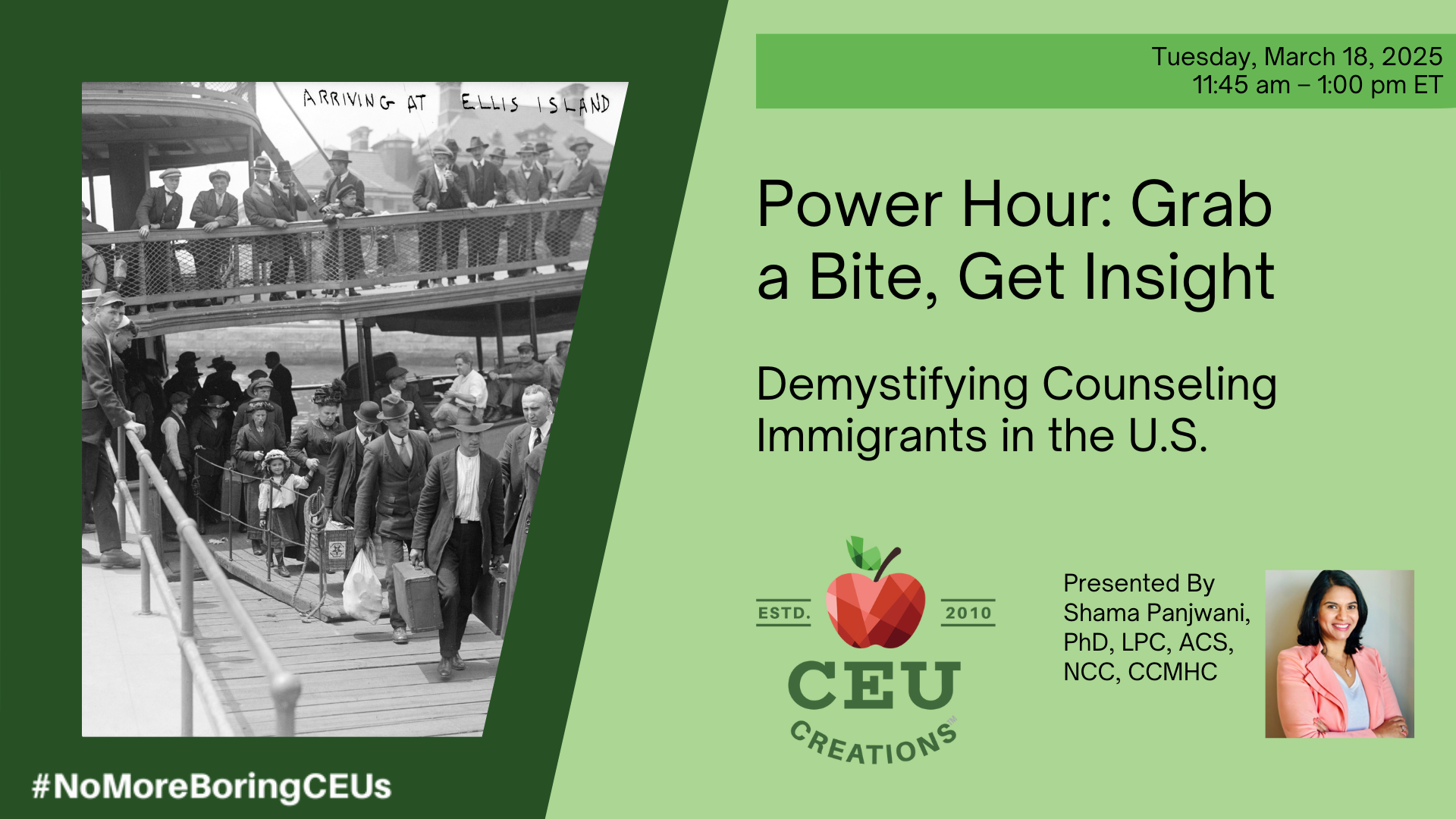Power Hour: Grab a Bite, Get Insight – Demystifying Counseling Immigrants in the U.S.
Date/Time
 Click here to view official flyer |
Date: Tuesday, 3/18/25 Time: 11:45 a.m. - 1:00 p.m. ET Location: LIVE STREAM Cost: Early Bird Registration: $14.99 Registration (After March 4th) $19.99
Credits: 1 CE Credit
|
Presenters
Presented by:
Shama Panjwani, PhD, LPC, ACS, NCC, CCMHC
Dr. Shama Panjwani is an Asian Indian speaker and expert in trauma-informed care, focusing on attachment, immigration, cultural/racial, and intergenerational traumas while integrating holistic wellness approaches to addressing trauma in a culturally competent manner. She is currently a professor in the clinical mental health counseling program at Keiser University. Dr. Shama has a private practice, SoHolisticEnergy Counseling & Consultation, LLC, where she provides clinical services to clients and supervisees. She also provides consulting services to organizations and institutions on Diversity, Equity, and Inclusivity (DEI) and Workplace Wellness.
Dr. Shama has a Ph.D. in counselor education and supervision with a specialization in Cross-Cultural Psychology and Organizational Leadership. She is a national certified counselor, a certified clinical mental health counselor, a board certified telemental health provider, licensed professional counselor and an approved clinical supervisor.
Her research presentations and publication focus on topics such as: reducing mental health stigma, immigration, acculturation, trauma, social justice and advocacy, multiculturalism and diversity, psychedelic-assisted therapy, crisis counseling, as well as approaches used to increase cross-cultural awareness and wellness, and leadership skills within academia and other institutions. She has been working in the mental health field for more than nine years. She is actively involved in doing consultations, workshops, and presentations to create awareness and destigmatize mental health and wellness for the BIPOC (Black Indigenous People of Color) community on an individual and organizational level by increasing their access to effective and culturally responsive treatment.
Demystifying Counseling Immigrants in the U.S.
11:45 a.m. – 12:00 p.m. ET: Registration / Networking
12:00 p.m. – 1:00 p.m. ET: Presentation – See event flyer for detailed agenda
1:00 p.m. ET: Closing/Evaluation
COST:
Early Bird Registration: $14.99
Registration $19.99 (After March 4th)
Registration FREE for CEs Plus U Bundle Members
Continuing Education Credits
Social Workers
ASWB ACE – 1 CE Credit
New York State Education Department’s State Board for Social Work – 1 Contact Hour
Nurses
California Board of Registered Nursing – 1 Contact Hour
Case Managers
CCMC – 1 Contact Hour
Counselors
NBCC ACEP – 1 Contact Hour
New York State Education Department’s State Board for Mental Health Practitioners – 1 Contact Hour
Attendance or applied credit certificate available for other credentials.
Please make sure to check with your own state board to ensure the transferability of CE credits.
Overview:
When individuals migrate to the United States, they do so in search for better opportunities or to escape persecution and dangers in their home country. Some may have supportive family or friends who already reside in the U.S. and know the lay of the land, while others are left to figure it out on their own. Quality of life for immigrants may be poor due to the lack of community resources and support (Garcini, et al., 2017). Finding a place to live, a place of employment, schools for their children, and focusing on their academic experience at universities can be difficult without someone to guide them. Employment opportunities are limited without proper language skills, education, status to work, or social connections. Acculturation can create identity confusion. Children may feel torn between following the family’s cultural values and the values of the country in which they now live. Additionally, acculturation can be accompanied by prejudice and discrimination making it difficult to adapt and causing mental health issues (Panjwani, 2020). On the other hand, acculturation can be positive if immigrants are educated, supported, and accepted by those around them (Fiske, et al., 2010). It can allow them to be tolerant of different cultures and be open to learning and experiencing the best of both worlds. Mental health professionals can better support the immigrant population by incorporating cultural responsiveness. Advocacy for resources and policy changes could also lead to better well-being for this population.
By Attending Our Workshop, You Will Be Able To:
- Identify misperceptions and myths about immigrants in the U.S, review immigration trends in the U.S., and understand common mental health issues faced by immigrant clients.
- Examine cultural considerations and ways to effectively work with immigrants in counseling
- Discuss ethical considerations and implications of working with immigrant clients.
